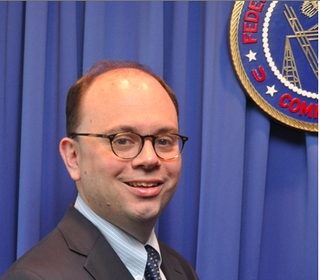Berry: FCC Lacks Authority to Preempt State Laws On Muni Broadband

Matthew Berry, chief of staff to FCC Commissioner Ajit Pai says the FCC definitely doesn't have the legal authority to preempt state broadband laws.
Matthew, who is former FCC general counsel and a former law clerk to Supreme Court Justice Clarence Thomas, was speaking Wednesday morning to the National Conference of State Legislatures' legislative summit in Minneapolis.
Those are the legislators who would up passing those laws the FCC is eyeing for preemption.
“The real debate is not about whether it is a good idea for cities to get into the broadband business, nor is it about whether states should restrict localities from getting into the broadband business," he planned to tell the crowd, according excerpts from his prepared remarks. "Rather, the debate at the Commission is going be about a relatively narrow but critical question: Does the FCC have the legal authority to preempt state laws regulating municipal broadband? And the answer to that question is a resounding no.”
The FCC is eyeing Sec. 706 authority to support preemption, which allows it to regulate to insure that advanced telecommunications is being provided in a reasonable and timely fashion — the same authority proposed to support net neutrality rules — but Berry suggests that is a reach that would exceed its legal grasp.
“Section 706 does not come close to containing the necessary clear statement that Congress intended to authorize the FCC to preempt state restrictions on municipal broadband projects," he says. "At best, any statement is as cloudy as the sky in Cold Bay, Alaska, the most overcast city in the United States. Consequently, any FCC attempt to preempt such state laws would be unlawful and sure to meet its end in court.”
“President Teddy Roosevelt popularized the advice: ‘Speak softly and carry a big stick.’ But when it comes to municipal broadband, the FCC has been embracing the opposite approach. Some at the Commission have been speaking loudly even though the agency has a small stick. Indeed, it probably has no stick at all.”
Multichannel Newsletter
The smarter way to stay on top of the multichannel video marketplace. Sign up below.
Wheeler has said some of the laws restricting municipal broadband are attempts by ISP incumbents, including cable operators, to prevent competition, and that he wants to use the FCC's authority to loosen "legal restrictions on the ability of cities and towns to offer broadband services to consumers in their communities."
The venue for the FCC's possible preemption action are the cities of Chattanooga, Tenn., and Wilson, N.C., which have asked the FCC to step in and overturn state laws limiting their ability to offer municipal broadband.
Earlier this week, Rep. Mike Doyle (D-Pa.) and Sen. Ed Markey (D-Mass.) pushed Wheeler to follow through on preemption.
For its part, the National Conference of State Legislatures has already told Wheeler that they would sue if the FCC tries to preempt their laws.
If the FCC does vote to preempt, it will likely be without the votes of either Pai or Republican Commissioner Michael O’Rielly.
Americans for Tax Reform President Grover Norquist added his voice to Berry's in advising the FCC to steer clear of preemption.
"The bipartisan National Council on State Legislatures has said that it will take the FCC to court to stop any attempt by the Commission to preempt state regulation of taxpayer-funded broadband networks," noted Norquist. "The FCC should not waste valuable time and taxpayer dollars in futile legal wrangling. It's none of the FCC's business if state governments forbid cities from wasting taxpayer dollars."
Contributing editor John Eggerton has been an editor and/or writer on media regulation, legislation and policy for over four decades, including covering the FCC, FTC, Congress, the major media trade associations, and the federal courts. In addition to Multichannel News and Broadcasting + Cable, his work has appeared in Radio World, TV Technology, TV Fax, This Week in Consumer Electronics, Variety and the Encyclopedia Britannica.

